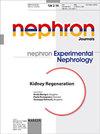{"title":"Beneficial Effects of AMP-Activated Protein Kinase Agonists in Kidney Ischemia-Reperfusion: Autophagy and Cellular Stress Markers.","authors":"Anne-Emilie Declèves, Kumar Sharma, Joseph Satriano","doi":"10.1159/000368932","DOIUrl":null,"url":null,"abstract":"<p><p>Background: Kidney ischemia-reperfusion is a form of acute kidney injury resulting in a cascade of cellular events prompting rapid cellular damage and suppression of kidney function. A cellular response to ischemic stress is the activation of AMP-activated protein kinase (AMPK), where AMPK induces a number of homeostatic and renoprotective mechanisms, including autophagy. However, whether autophagy is beneficial or detrimental in ischemia-reperfusion remains controversial. We investigated the effects of agonist induction of AMPK activity on autophagy and cell stress proteins in the model of kidney ischemia-reperfusion. Methods: AMPK agonists, AICAR (0.1 g/kg) and metformin (0.3 g/kg), were administered 24 h prior to ischemia, with kidneys harvested at 24 h of reperfusion. Results: We observed a paradoxical decrease in AMPK activity accompanied by increases in mammalian target of rapamycin (mTOR) C1 activity and p62/SQSTM1 expression. These results led us to propose that AMPK and autophagy are insufficient to properly counter the cellular insults in ischemia-reperfusion. Agonist induction of AMPK activity with AICAR or metformin increased macroautophagy protein LC3 and normalized p62/SQSTM1 expression and mTOR activity. Ischemia-reperfusion increases in Beclin-1 and PINK1 expressions, consistent with increased mitophagy, were also mitigated with AMPK agonists. Stress-responsive and apoptotic marker expressions increase in ischemia-reperfusion and are significantly attenuated with agonist administration, as are early indicators of fibrosis. Conclusions: Our data suggest that levels of renoprotective AMPK activity and canonical autophagy are insufficient to maintain cellular homeostasis, contributing to the progression of ischemia-reperfusion injury. We further demonstrate that induction of AMPK activity can provide beneficial cellular effects in containing injury in ischemia-reperfusion. © 2014 S. Karger AG, Basel.</p>","PeriodicalId":18993,"journal":{"name":"Nephron Experimental Nephrology","volume":" ","pages":"None"},"PeriodicalIF":0.0000,"publicationDate":"2014-12-06","publicationTypes":"Journal Article","fieldsOfStudy":null,"isOpenAccess":false,"openAccessPdf":"https://www.ncbi.nlm.nih.gov/pmc/articles/PMC4458239/pdf/nihms637786.pdf","citationCount":"0","resultStr":null,"platform":"Semanticscholar","paperid":null,"PeriodicalName":"Nephron Experimental Nephrology","FirstCategoryId":"1085","ListUrlMain":"https://doi.org/10.1159/000368932","RegionNum":0,"RegionCategory":null,"ArticlePicture":[],"TitleCN":null,"AbstractTextCN":null,"PMCID":null,"EPubDate":"","PubModel":"","JCR":"","JCRName":"","Score":null,"Total":0}
引用次数: 0
Abstract
Background: Kidney ischemia-reperfusion is a form of acute kidney injury resulting in a cascade of cellular events prompting rapid cellular damage and suppression of kidney function. A cellular response to ischemic stress is the activation of AMP-activated protein kinase (AMPK), where AMPK induces a number of homeostatic and renoprotective mechanisms, including autophagy. However, whether autophagy is beneficial or detrimental in ischemia-reperfusion remains controversial. We investigated the effects of agonist induction of AMPK activity on autophagy and cell stress proteins in the model of kidney ischemia-reperfusion. Methods: AMPK agonists, AICAR (0.1 g/kg) and metformin (0.3 g/kg), were administered 24 h prior to ischemia, with kidneys harvested at 24 h of reperfusion. Results: We observed a paradoxical decrease in AMPK activity accompanied by increases in mammalian target of rapamycin (mTOR) C1 activity and p62/SQSTM1 expression. These results led us to propose that AMPK and autophagy are insufficient to properly counter the cellular insults in ischemia-reperfusion. Agonist induction of AMPK activity with AICAR or metformin increased macroautophagy protein LC3 and normalized p62/SQSTM1 expression and mTOR activity. Ischemia-reperfusion increases in Beclin-1 and PINK1 expressions, consistent with increased mitophagy, were also mitigated with AMPK agonists. Stress-responsive and apoptotic marker expressions increase in ischemia-reperfusion and are significantly attenuated with agonist administration, as are early indicators of fibrosis. Conclusions: Our data suggest that levels of renoprotective AMPK activity and canonical autophagy are insufficient to maintain cellular homeostasis, contributing to the progression of ischemia-reperfusion injury. We further demonstrate that induction of AMPK activity can provide beneficial cellular effects in containing injury in ischemia-reperfusion. © 2014 S. Karger AG, Basel.


AMP-活化蛋白激酶激动剂在肾缺血再灌注中的益处:自噬和细胞应激标志物。
背景:肾脏缺血再灌注是一种急性肾损伤,会导致一连串的细胞事件,促使细胞迅速受损并抑制肾功能。细胞对缺血应激的一种反应是激活 AMP 激活蛋白激酶(AMPK),AMPK 可诱导包括自噬在内的多种平衡和肾保护机制。然而,自噬在缺血再灌注中是有益还是有害仍存在争议。我们研究了肾缺血再灌注模型中激动剂诱导 AMPK 活性对自噬和细胞应激蛋白的影响。研究方法缺血前 24 小时给予 AMPK 激动剂 AICAR(0.1 克/千克)和二甲双胍(0.3 克/千克),再灌注 24 小时收获肾脏。结果我们观察到 AMPK 活性的下降与哺乳动物雷帕霉素靶标(mTOR)C1 活性和 p62/SQSTM1 表达的增加相矛盾。这些结果使我们提出,AMPK 和自噬不足以正确应对缺血再灌注对细胞造成的损伤。用 AICAR 或二甲双胍诱导 AMPK 活性可增加大自噬蛋白 LC3,并使 p62/SQSTM1 表达和 mTOR 活性正常化。缺血再灌注时 Beclin-1 和 PINK1 表达的增加与有丝分裂的增加一致,而 AMPK 激动剂也能缓解这种增加。应激反应和凋亡标志物的表达在缺血再灌注时会增加,服用激动剂后会显著减少,纤维化的早期指标也是如此。结论:我们的数据表明,肾脏保护性 AMPK 活性和典型自噬水平不足以维持细胞平衡,从而导致缺血再灌注损伤恶化。我们进一步证明,诱导 AMPK 活性可在缺血再灌注损伤中提供有益的细胞效应。© 2014 S. Karger AG, Basel.
本文章由计算机程序翻译,如有差异,请以英文原文为准。




